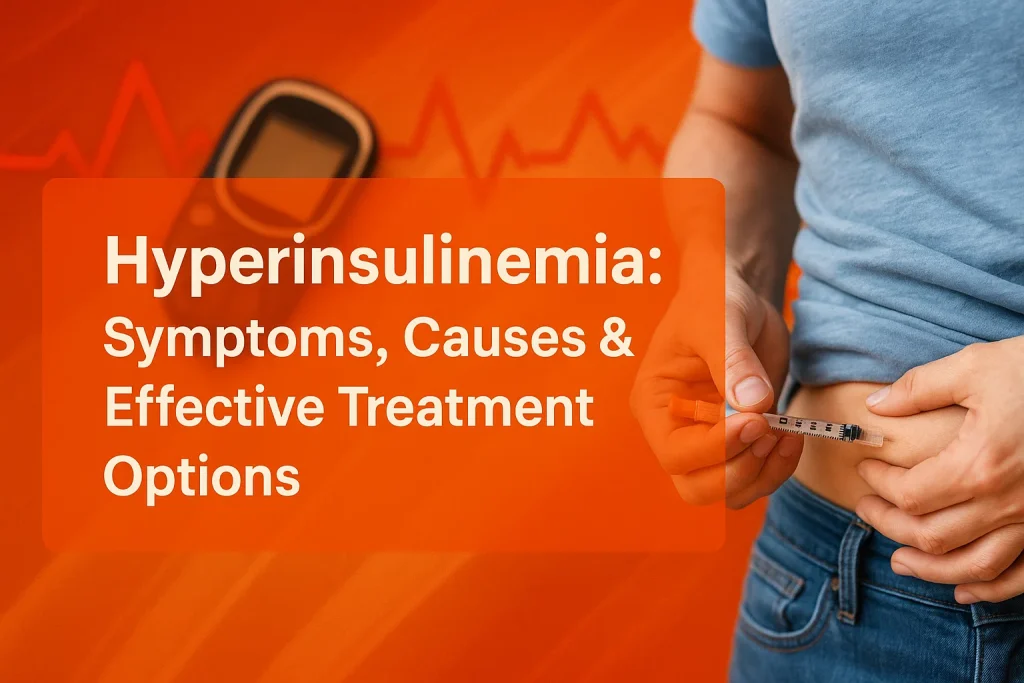
Hyperinsulinemia: Symptoms, Causes & Effective Treatment Options
Hyperinsulinemia means a high level of insulin in the blood. While often neglected, it is involved in many serious metabolic issues, such as obesity, type 2 diabetes, and heart disease. Unlike diabetes, where insulin is low or ineffective, hyperinsulinemia causes your body to produce too much insulin as a response to insulin resistance. In this article, we’ll explore the main causes, common symptoms, health risks, and effective treatment options for hyperinsulinemia in detail.
What is Hyperinsulinemia?
Hyperinsulinemia is characterized by high insulin levels in the blood due to insulin resistance, which makes the body insensitive to insulin, causing the pancreas to release more insulin, resulting in a hyperinsulinemic condition.
If it becomes chronic, hyperinsulinemia can cause severe health conditions like high blood sugar (hyperglycemia) and may lead to prediabetes and Type 2 Diabetes. By knowing about the disease, possible treatments can be given through early detection and screening.
What are the symptoms and Causes of Hyperinsulinemia?
It comes with no earlier symptoms if your pancreas is producing enough insulin. In case of a chronic condition, hyperinsulinemia can lead to Prediabetes or Type 2 Diabetes.
Early symptoms of prediabetes include:
- Acanthosis nigricans (skin darkening around near armpit or the back and sides of your neck)
- Diabetic retinopathy (damaged blood vessels of the retina).
- Small Skin outgrowth.
What are the symptoms of Type 2 diabetes?
- Blurry vision.
- Excessive thirst.
- Headaches.
- Frequent urination.
- Increased food appetite.
- Vaginal and skin infections.
- Slow healing wounds (due to increased blood sugar level).
What are the risk factors associated with hyperinsulinemia?
Several risk factors are associated with Hyperinsulinemia that need to be controlled and managed before any serious health condition arises. These include:
- People with a sedentary lifestyle or no physical activity.
- Bad habits such as Smoking and drinking.
- Excess weight or obesity.
- Family history of diabetes.
- High Cholesterol level.
- Patient with a history of heart disease and stroke.
- Sleep apnea (a sleeping disorder)
What if my insulin level is high?
Apart from diabetes, high Insulin levels can cause severe health conditions, some of which are:-
- Excessive weight gain (a sign of obesity).
- Metabolic Disorders.
- High uric acid. (Hyperuricemia)
- Hardened arteries (atherosclerosis).
- High blood pressure (hypertension).
- Polycystic ovary syndrome (PCOS).
How to diagnose Hyperinsulinemia?
Hyperinsulinemia cannot be diagnosed unless the insulin tolerance is compromised, and no single blood test can check the excessive insulin level in our body. Your provider will check for several factors, such as
- Physical examination or through signs and symptoms
- Medical History of the Patient
- Biological history of the patient
Note- All of the above factors are important for figuring out what the situation is and what steps need to be taken to treat it.
What are the Blood tests for hyperinsulinemia?
There are no specific blood tests to diagnose this condition, but
- Fasting insulin test- Insulin level after an overnight fast (usually 8-12 hrs)
- HOMA-IR (Homeostasis Model Assessment of Insulin Resistance)- It is a calculative method to check for the insulin level in the body.
Formula: (Fasting insulin µIU/mL × Fasting glucose mg/dL) ÷ 405
(or ÷ 22.5 if using mmol/L)
- Fasting Blood glucose test– This test is used to measure the insulin resistance indices to check for hyperinsulinemia.
- HBA1C test—measures the average blood sugar level over 3 Months
- C- peptide test—measures how much insulin is produced by the pancreas.
How to manage Hyperinsulinemia?
Hyperinsulinemia can be managed through certain diet and lifestyle changes, which include
Diet Modifications:
To Avoid: Food high in trans fats, processed starches, processed carbohydrates, processed foods, and sugar can increase the production of insulin and cause abnormal blood insulin levels
To Include: Foods such as pulses, whole grains, lean meat, fish, vegetables, and fruits aid in regulating insulin levels, positively affecting our overall health.
Lifestyle Modifications:
- Be Physically Active: Regular exercise helps you maintain a healthy weight and enhances blood circulation and metabolism, which keeps insulin levels normal, supports organ health, and helps regulate blood sugar levels.
- Avoid smoking and drinking: May lead to abnormal insulin and blood sugar levels in our body as well as RBC count in our body.
- Good Sleep: Sleep is vital for maintaining a healthy body since it promotes metabolism, regulates body weight, and aids in detoxification.
Takeaway:
Hyperinsulinemia is a potentially harmful condition that is often linked to insulin resistance and can lead to diabetes, which has severe effects on our body, a good diet, exercise, and medications can help restore normal insulin levels. If you experience frequent hypoglycemia or unexplained weight gain, consult a doctor for testing, such as fasting insulin & glucose tolerance tests, for diagnosis and effective treatment of the condition.
FAQs
Is Hyperinsulinemia related to cancer?
Yes, it may be associated with the increased risk of various types of cancer, like pancreatic cancer, colon cancer, breast cancer and prostate cancer.
Is hyperinsulinemia the same as diabetes?
No. It often precedes type 2 diabetes. Many people with hyperinsulinemia still have normal blood sugar, but their bodies are compensating by overproducing insulin.
Can hyperinsulinemia be reversed?
In many cases, yes, especially if addressed early. Lifestyle interventions can significantly reduce insulin levels and improve insulin sensitivity.
What Disease can be caused due to Hyperinsulinemia?
Prediabetes and Type 2 Diabetes may be caused due to insulin resistance, which can lead to an abnormally high level of insulin in our blood.
How to treat Hyperinsulinemia?
You can treat them through certain Lifestyle and diet modifications, like as regular exercise, quality sleep, consuming healthy food such as whole grains, pulses, and avoiding processed foods and trans fats.
- Anemia Explained: Types, Symptoms & Best Treatment Options
- Irregular Periods: Causes, Symptoms & Best Treatments







